Updated: December 9, 2024
Thinking about having an efficient and high-performing mobile app for your business? Always a smart move. A well-built app can drive real value for your customers and your business.
Likely, the first questions you may have — what about the cost?
You’ve probably come across a wide range of price tags online, but here’s the thing: app development costs aren’t one-size-fits-all. The final price depends on several factors—like the type of app, its complexity, infrastructure needs, development approach, your budget, team size, launch timeline, and more.
Here’s the kicker: no reputable tech partner can give you an exact figure right away. Why? Because they need to fully understand your expectations, assess what you already have in place, and figure out the best way to take you from where you are now to where you want to be.
Let’s break it all down and uncover what really goes into that price tag to help answer your questions and set clear expectations. An app development cost breakdown will help you understand how various factors like team rates and project complexity influence the overall expenses of app creation.
App Development Cost Influential Factors
Being honest here, it’s impossible to give an accurate cost without knowing your goals and what you want to achieve with your app. There’s a big difference between building a simple app, like a fitness calculator, and developing a complex one with extensive data (which your tech partner will need to assess, store, clean, and integrate), VR/AR, predictive analytics, third-party integrations, and technologies like AI and ML. The list of possibilities goes on.
So, back to the question: “What is the cost of mobile and web app development?” The answer varies greatly and app development cost depends on several factors, including the scope of work, the complexity of the app, features and functionalities, and the hourly rates of developers based on their location and expertise. To help you better define your requirements and approach app development companies, here are some key questions to consider:
- What type of app are you building? Start by mapping out the app’s core functionality and purpose. This will help you understand its complexity. Not sure where to start? Don’t worry—your tech partner can help you sort it out.
- Which platforms and devices will it support? Are you building for iOS, Android, or both? And which devices do you want to cover? For example, will it run on the iPhone 15 Pro Max, Samsung Galaxy S10 Plus, or maybe even tablets?
- Do you need a specialized team?If your project requires specific expertise, like native app development for iOS or Android, you might need experts. If you’re aiming for a faster launch, cross-platform development might be a better fit.
- Will your app need third-party integrations? Think about if your app will connect to tools like HubSpot, Zapier, Salesforce, or any other platforms. These integrations can add functionality but might also affect the budget.
- Will your app use smartphone features? Are you planning to include features like GPS, NFC, AR, or motion co-processors? Using built-in hardware can add exciting functionality but may also impact development time and costs.
- What’s the maintenance plan? Launching your app is just the beginning. You’ll need ongoing updates to fix bugs and add new features. At Intellectsoft, we provide end-to-end support, so your app stays fresh and functional long after it’s live.
- What’s your timeline? How soon do you need to launch? Knowing your deadline will help you and your development partner set clear priorities and work efficiently.
- What’s your budget? Your budget will guide the development approach—whether it’s native or cross-platform. Keep in mind, native apps usually cost more but can offer higher performance for specific platforms.
- How much support do you need? Are you just looking for help with the Discovery and Development phases to build an MVP? Or do you need full-cycle support for a large, enterprise-level app?
- How important is UX/UI design? A great app needs great design. Decide how much effort you want to put into creating a user-friendly and visually appealing experience.
Let’s Talk Hours and Rates
Building an app takes time, and time equals money—especially when you’re talking about development hours. In the U.S., the average hourly rate for an app developer starts at $100, according to Salary.com. That means even a relatively simple app can quickly become a major investment.
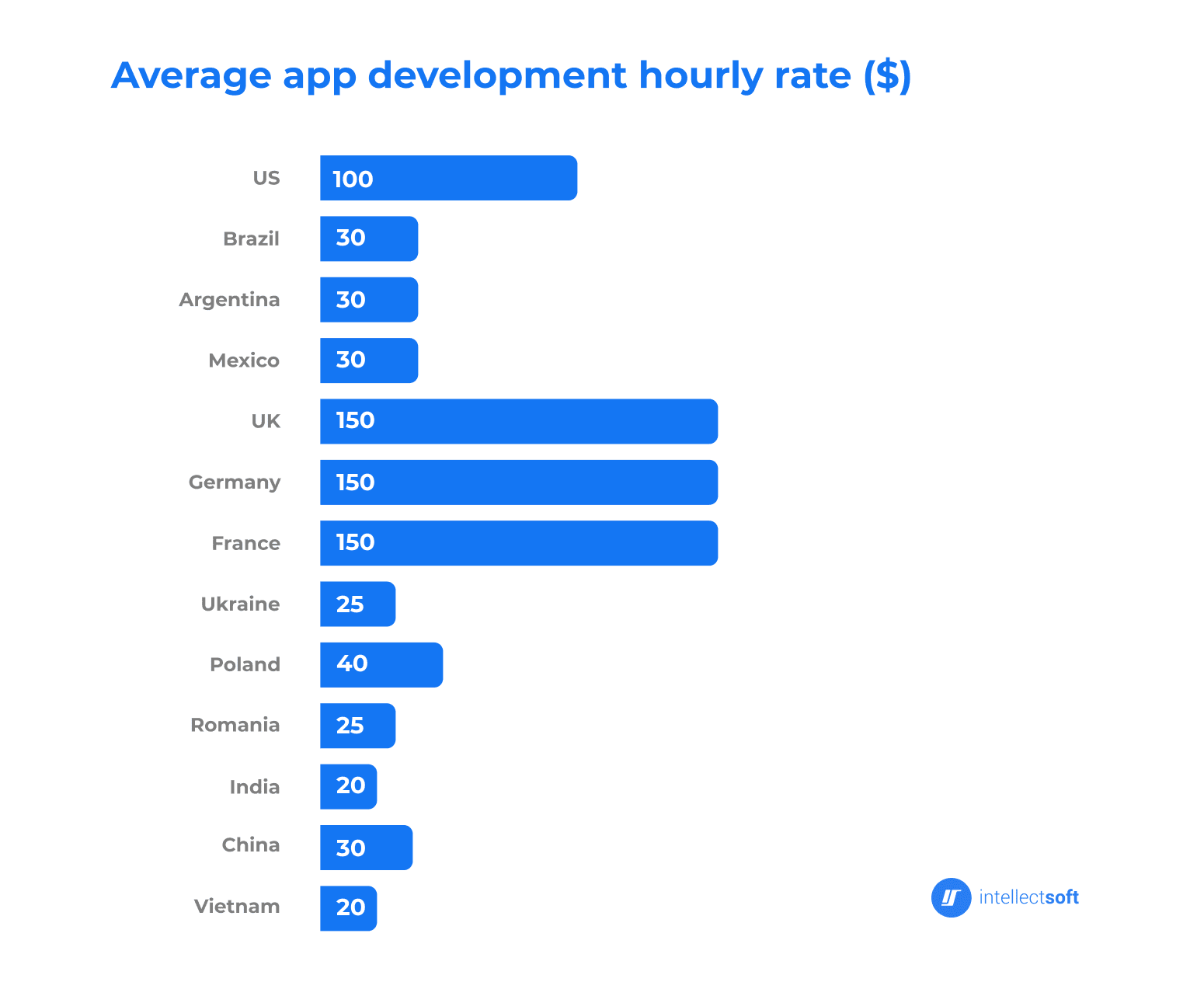
Outsourcing app development can be a game-changer. Many businesses turn to regions like Eastern Europe or Latin America, where you’ll find top-notch developers offering competitive rates. App developers in these regions have proven their reliability, delivering high-quality apps for some of the world’s leading companies.
If you’re looking to balance cost with quality, we offer expert outsourcing options and dedicated development teams to help you bring your app to life—efficiently and cost-effectively.
App Complexity Matters
App complexity heavily impacts the cost of mobile app development. The complexity of an app can be grouped into three types: simple, medium, and complex.
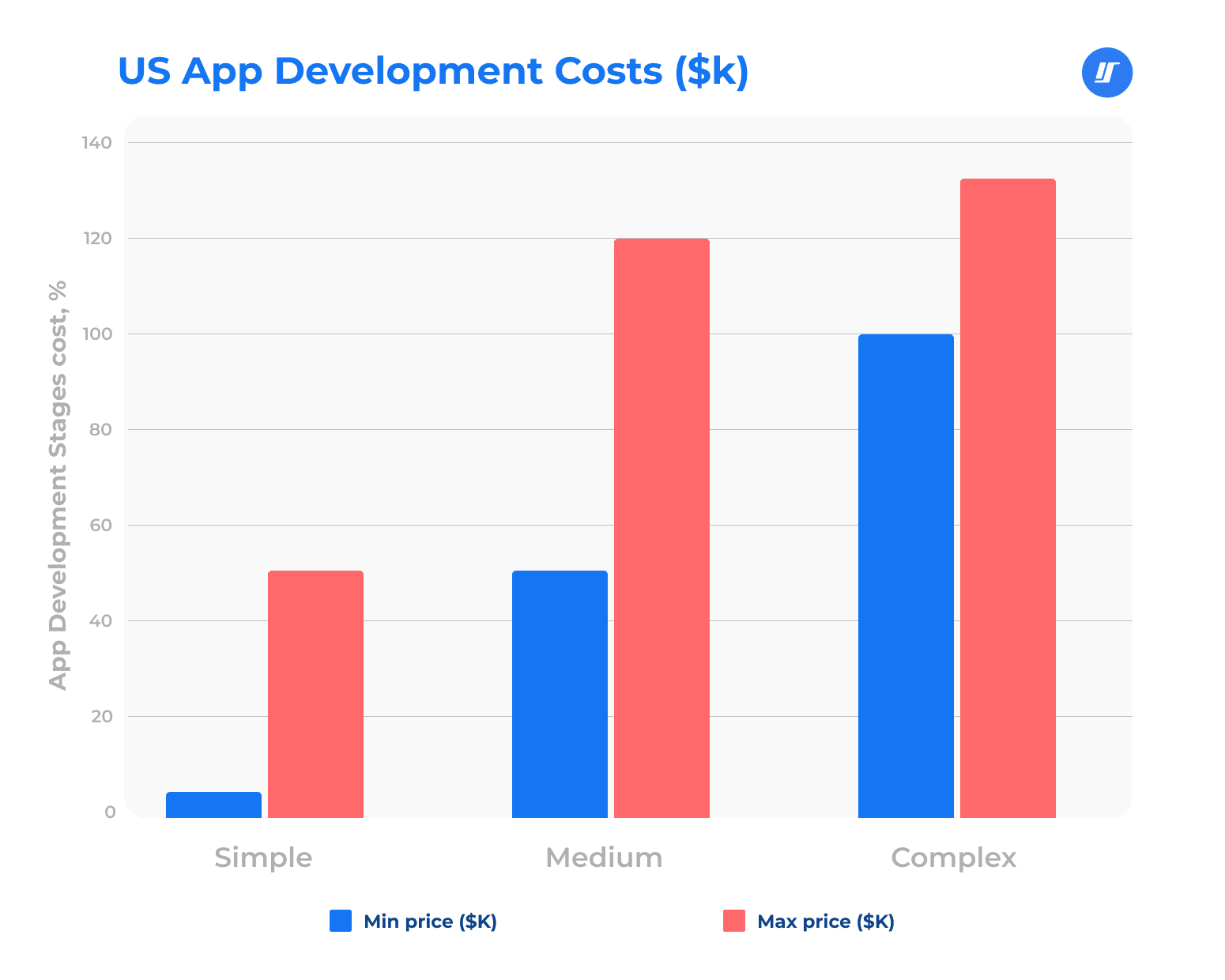
These are just estimates—your tech partner will need to understand your specific requirements before providing an accurate quote.
- Simple Apps: These apps have a basic set of features and functionalities, such as user profiles, navigation, and a simple user interface. They are straightforward to develop and typically take around 2-3 months to complete. For example, basic fitness trackers or calculators.
- Medium Apps: Medium complexity apps are more challenging to create as they contain more sophisticated features, interactive elements, and a larger amount of content. Such as social networking apps, e-commerce platforms, and online learning tools. The development time for medium apps is usually 4-6 months.
- Complex Apps: Complex apps come with advanced features, responsive design, extensive navigation, third-party integrations, and a high level of complexity. Some of these are custom-built EHR/EMR systems for healthcare organizations or large-scale enterprise solutions. Developing a complex app can take anywhere from 6 to 12 months. These apps often need strong backend infrastructure, data processing, and security measures.
App Development Cost Benchmarks
To give you a clearer picture of how your development team calculates a price tag, we’ve pulled together some stats from Clutch and Salary.com. Keep in mind, pricing can vary between companies and is often negotiable. Typically, your tech partner’s estimate will include factors like team size, hours worked, salaries, hardware, and other resources.
The chart below, based on data from Business of Apps and Clutch, gives a clear picture of how companies typically divide their budgets across key stages—Discovery, Design, Development, and Testing & Deployment. If you want to dive deeper into how it all works, check out our blog on the software development lifecycle.
Here’s a quick breakdown of the cost brackets and percentages for each stage.
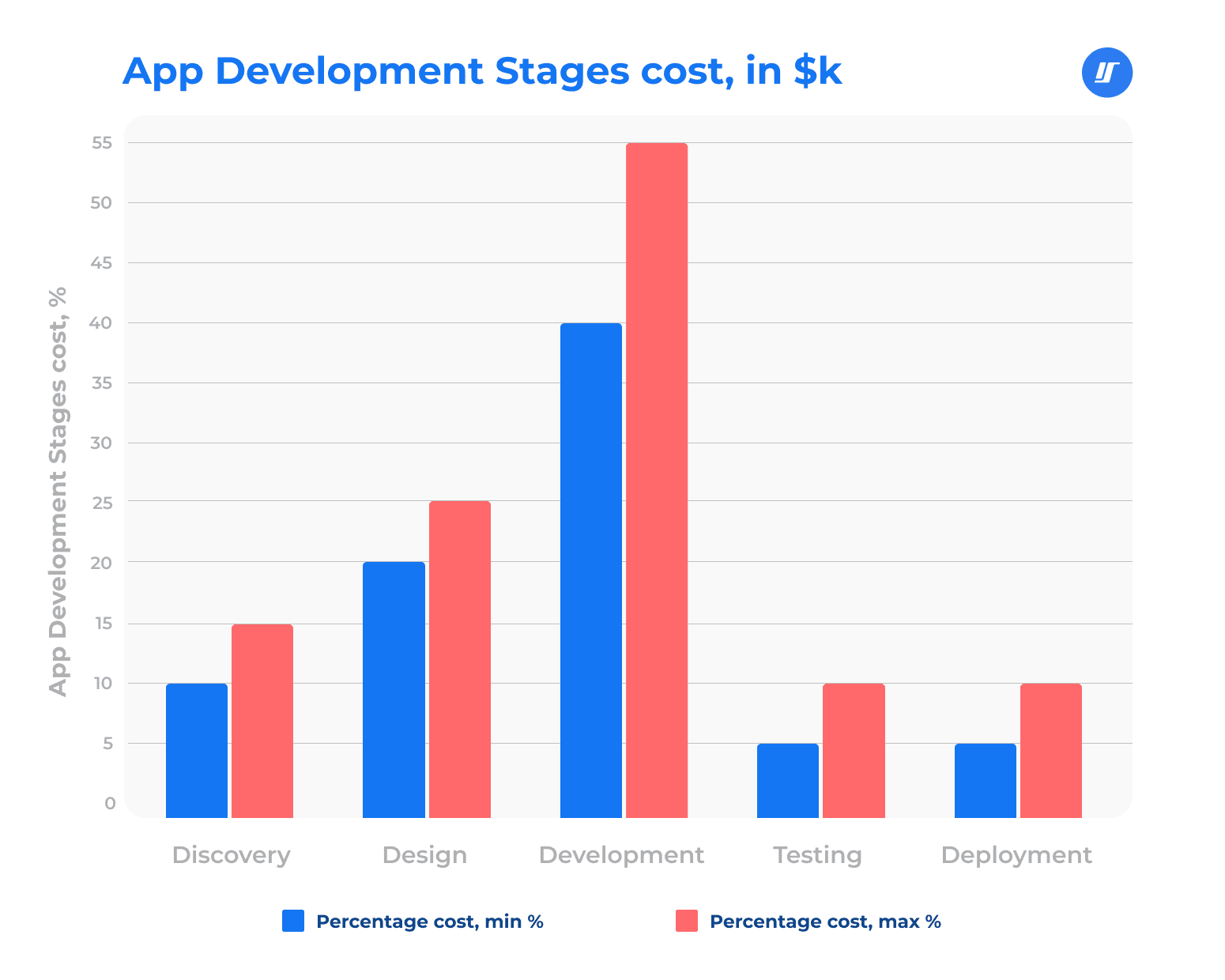
- Discovery Stage (10–15%) (Optional: If you already have the requirements, you can skip this stage)
Focused on requirement analysis and project scoping to lay the groundwork for development. - Design Stage (20–25%)
Here, your tech partner brings the visual side to life with UI/UX design, wireframes, prototypes, and mockups, crafting an app that’s both functional and attractive. - Development Stage (40–55%)
Unsurprisingly, the largest share of the budget is allocated to coding, backend infrastructure, and feature integration, bringing the designs to life as a fully functional app. - Testing Stage (15–20%)
This important stage involves rigorous QA testing, including unit, system, and regression testing, to identify and fix bugs for smooth app performance. - Deployment Stage (5–10%).
Focuses on launching the app in stores, ensuring post-launch maintenance, updates, and ongoing functionality.
According to Clutch, most companies spent between $5,000 and $10,000 on the Discovery stage, which made up about 10% to 20% of their total budget. For those in the highest spending range—$40,000 or more—it only accounted for 5% to 10% of the overall budget.
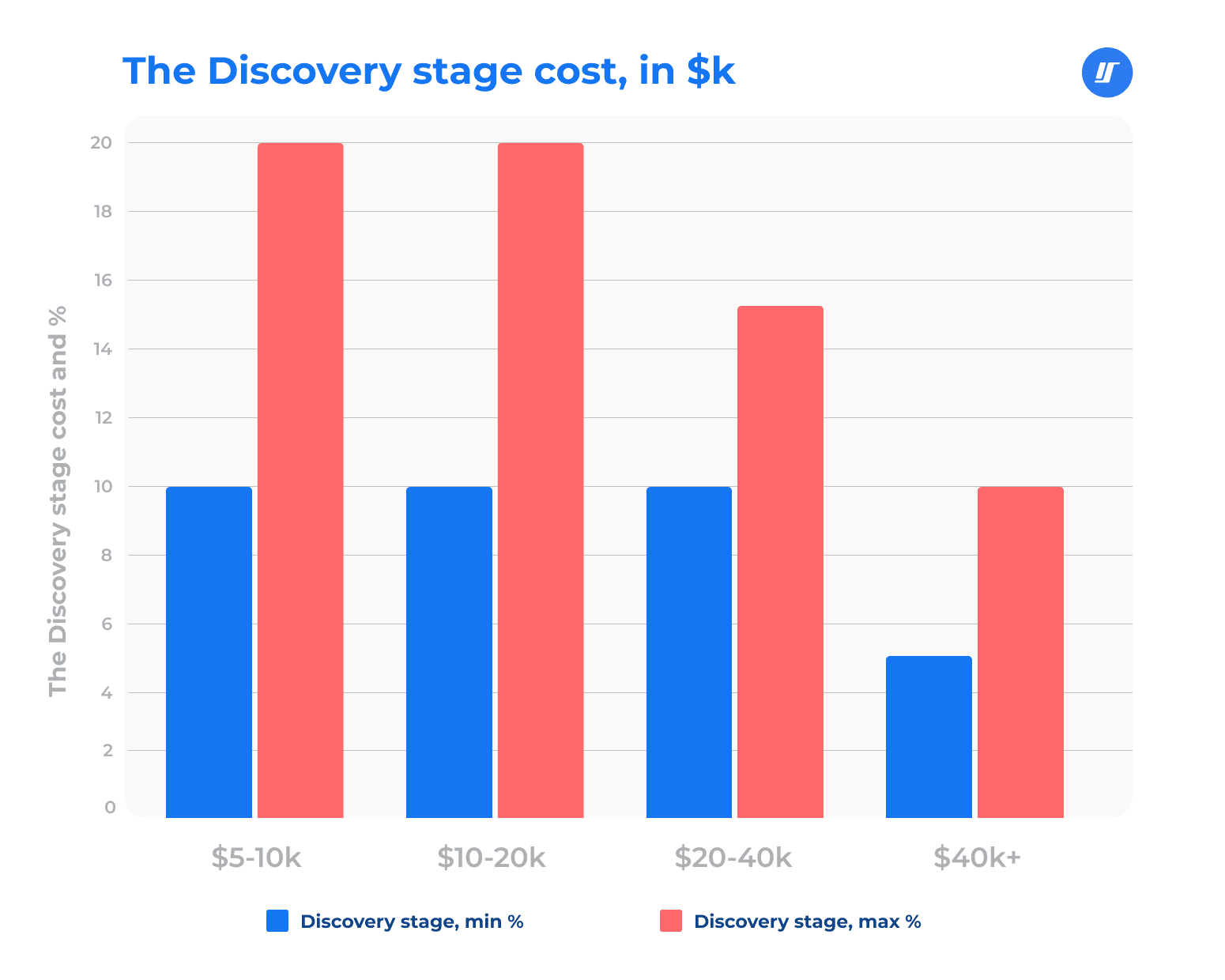
When it comes to the Design stage, costs fall into a few brackets. The range of $5k–$10k took up 10%–15% of the total budget. Moving up, the $10k–$25k range accounted for 20%–25%, similar to the $25k–$50k bracket. The highest tier, $50k+, made up about 15%–20% of the budget.
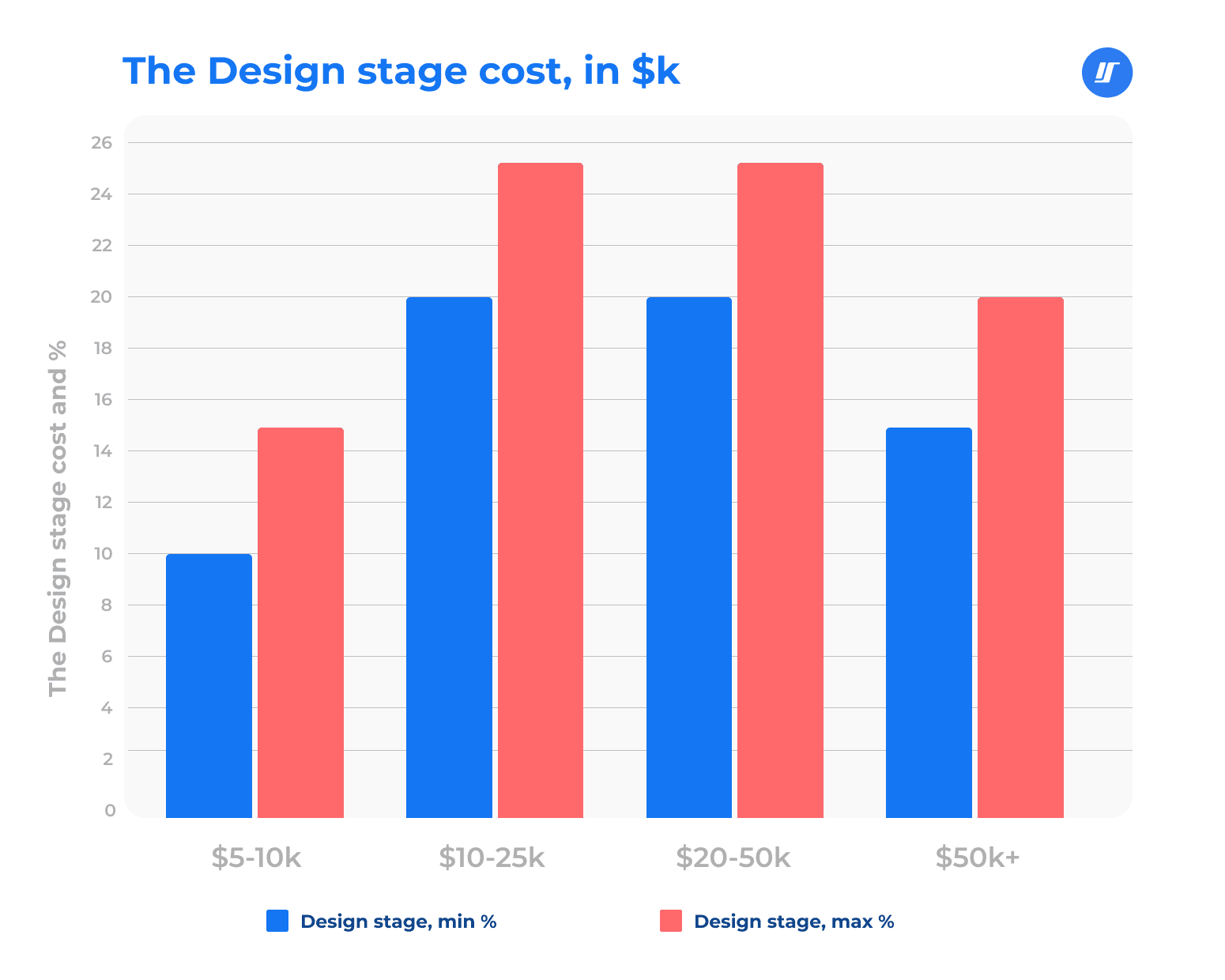
Development takes the largest share of the app development process, covering the coding of all features. It typically consumes 40%–50% of the budget, with costs falling into these ranges: $30k–$70k, $70k–$150k, and $150k–$300k.
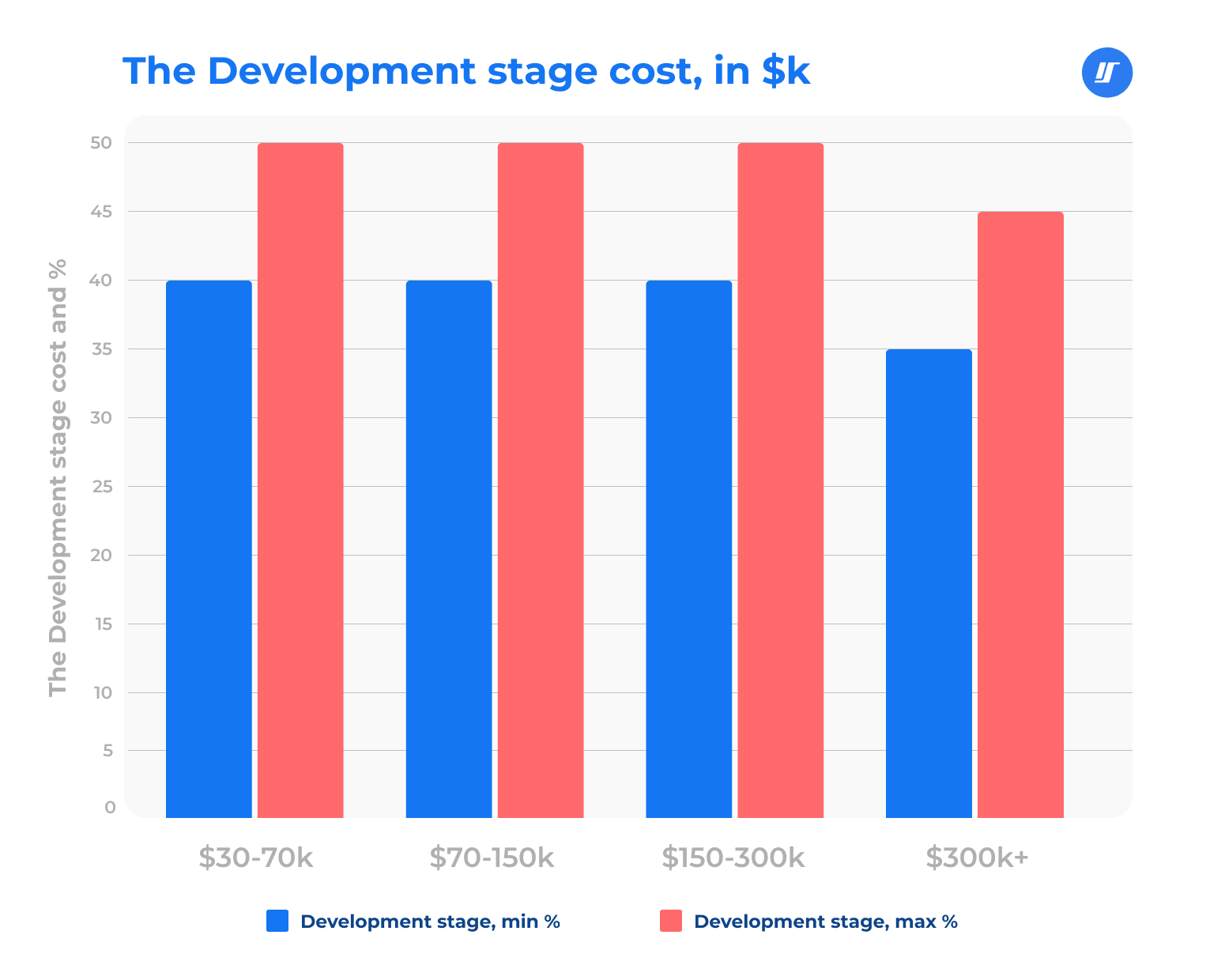
The collaboration with tech partners doesn’t stop at Development—Testing and Deployment are essential to ensure a bug-free, smoothly launched app. Because let’s face it—nobody wants their shiny new app to crash right after launch.
Companies typically spent $5k–$50k on this stage, with simple apps costing $5k–$15k, mid-complexity apps $15k–$30k, and complex apps $30k–$50k—each accounting for 10–15% of the budget.
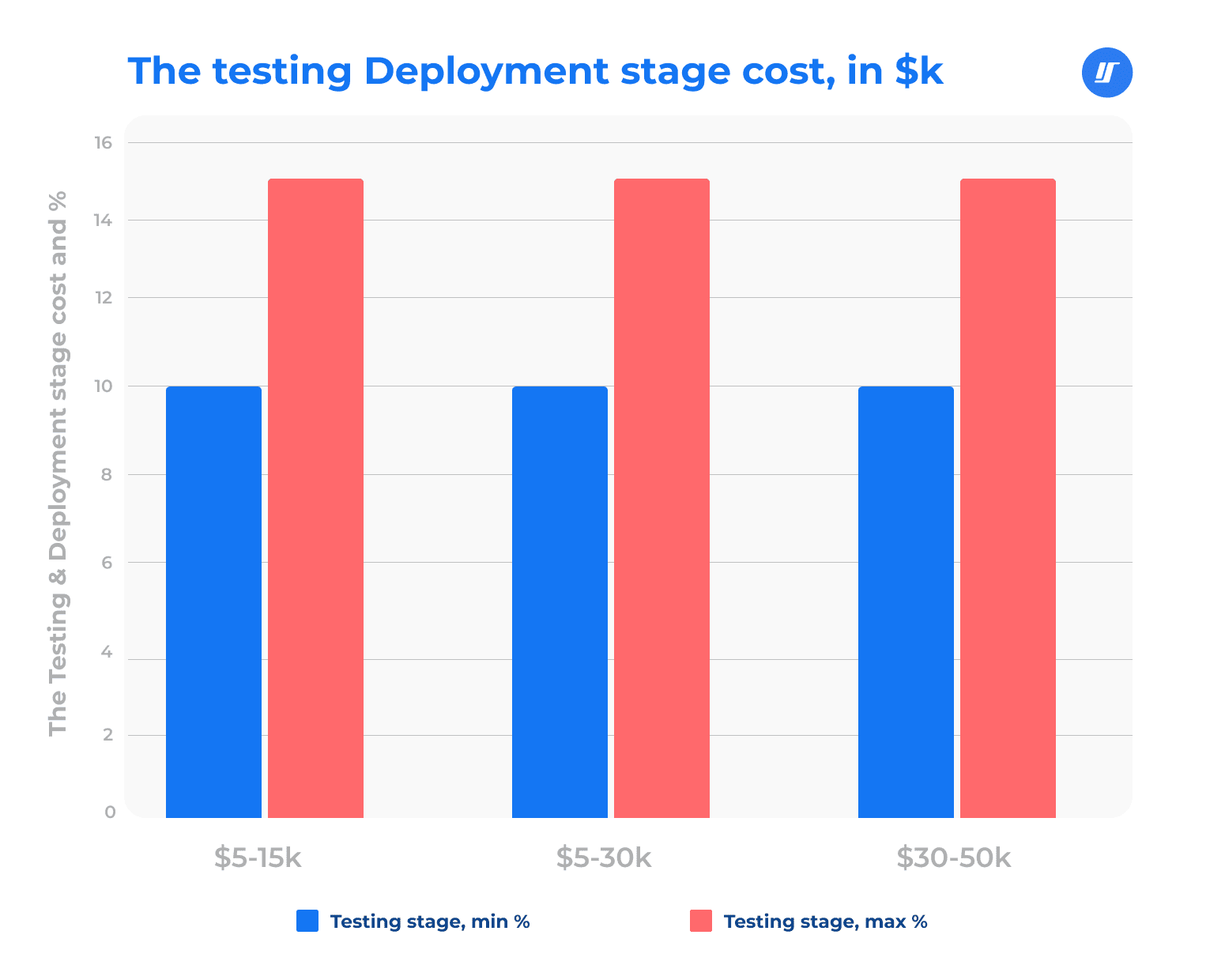
What are the hidden costs in app development?
1. Post-Launch Maintenance
The app maintenance cost doesn’t end when the app is launched. Ongoing updates, bug fixes, and compatibility adjustments (e.g., for new OS versions) are essential to keep the app running smoothly.
2. App Store Fees
Publishing your app on platforms like the Apple App Store and Google Play comes with fees.
3. Third-Party Services and Integrations
If your app uses third-party APIs or services (e.g., payment gateways, geolocation, analytics tools), those come with costs. Stripe Gateway for payments, Google Maps for geolocation.
4. Cloud and Hosting Services
Apps that rely on cloud storage or backend services require ongoing hosting costs. AWS, Google Cloud, Firebase.
5. Security and Compliance
Be sure your app is secure and compliant with regulations like GDPR or HIPAA – it can be a hidden expense. Cost depends on the level of security and industry requirements.
6. Scaling and Performance Optimization
As your user base grows, you’ll need to scale your infrastructure, optimize performance, and handle higher traffic, all of which contribute to app maintenance costs. Consider these factors as well. Adding servers, load balancers, or optimizing databases.
Trends Impacting Development Costs
- Chatbots & Chat Features
Chatbots are game-changers for customer engagement and 24/7 support. But integrating AI and natural language processing (NLP) isn’t always quick or cheap. It’s an investment that pays off in better user experiences.
- Multi-Factor Authentication (MFA)
MFA is a must-have for strong security these days. From biometrics to token-based logins, it boosts trust and compliance. Yes, it adds to costs, but your users (and regulators) will thank you.
- Targeted Push Notifications
Personalized push notifications keep users coming back. But making them truly effective takes advanced data segmentation and analytics integration, which can complicate and stretch the budget.
- Augmented Reality (AR) & Virtual Reality (VR)
AR and VR bring next-level experiences to retail, gaming, and more. They also need specialized tools and expertise, making them pricier to implement.
- Machine Learning & AI
AI is revolutionizing development. It handles repetitive tasks, optimizes processes, and delivers insights that wow. But getting AI right takes effort—clean data, training models, and expert integration all add up.
- Mobile Cloud Computing
Cloud tech enables seamless scaling—no huge upfront costs, just flexibility when you need it. Still, integrating and managing cloud solutions can add complexity to your project.
Data is gold if you know how to use it. Analytics turns raw numbers into actionable insights. But it needs clean, well-prepped data from skilled engineers to work its magic.
These trends push boundaries, but they also push budgets. Planning an app development budget is crucial to manage costs effectively. With the right strategy and a trusted tech partner, you can balance innovation and cost, delivering solutions that make a real impact.
How to Prepare for App Development Cost Estimation
1. Define Your Goals and Scope
For mobile apps, it’s important to define:
- The app’s primary purpose and type (e.g., e-commerce, social networking, or healthcare apps).
- Core features like user authentication, push notifications, GPS tracking, and payment integration.
- Platforms: Will the app be built for iOS, Android, or both?
2. Understand Development Costs
In mobile app development, these factors are relevant:
- Frameworks: Using cross-platform tools like React Native or Flutter is often more cost-effective than building separate native apps.
- Team Expertise: The app’s complexity, including features like real-time data processing or AR/VR, may require senior developers, whereas simpler apps might rely on a smaller team or junior developers.
3. Account for Infrastructure Expenses
Apps rely heavily on backend infrastructure:
- Cloud Solutions: Scalable cloud services like AWS or Firebase are often the go-to for mobile apps. They enable efficient data storage and real-time updates.
- Scaling Needs: As app downloads and active users grow, you’ll need robust backend support, including databases, APIs, and server load management.
4. Prioritize Security
Mobile apps often handle sensitive data (e.g., user profiles, payment details). Key considerations to have in mind:
- Implementing secure APIs for data transfer.
- Adding encryption to protect user data on both the device and the server.
- Complying with mobile-specific regulations like Apple’s App Store guidelines or Android’s Play Store policies.
5. Plan for Long-Term Costs
Mobile apps require consistent updates for:
- Adapting to new operating system versions (iOS and Android release updates annually).
- Bug fixes and performance enhancements based on user feedback.
- Adding new features as user expectations grow.
Planning ahead for scalability, security, and regular updates is key to building a budget that supports both the app’s launch and its long-term success, ultimately affecting the final app development cost.
Wrapping up: So How Much Does It Cost to Make an App for My Business?
Building a mobile app is a game-changer for businesses looking to deliver value to their customers and stay competitive. But when it comes to cost, there’s no universal answer. The price of mobile app development depends on a variety of factors—like the app’s purpose, complexity, platforms (iOS, Android, or both), and the level of features.
If you’re planning to develop a simple app, prototype, or MVP, the costs will be significantly different from building a feature-rich app with advanced functionalities like AI, AR, or real-time data processing.
Long-term considerations like regular updates, scalability, and security should also factor into your budget.
Feeling unsure about where to start? Don’t worry. At Intellectsoft, we specialize in mobile app development and can help you navigate the entire process—whether it’s defining your app’s goals, choosing the right features, or building within your budget. Our team is here to guide you from idea to launch and beyond.
Subscribe to updates
Source link











